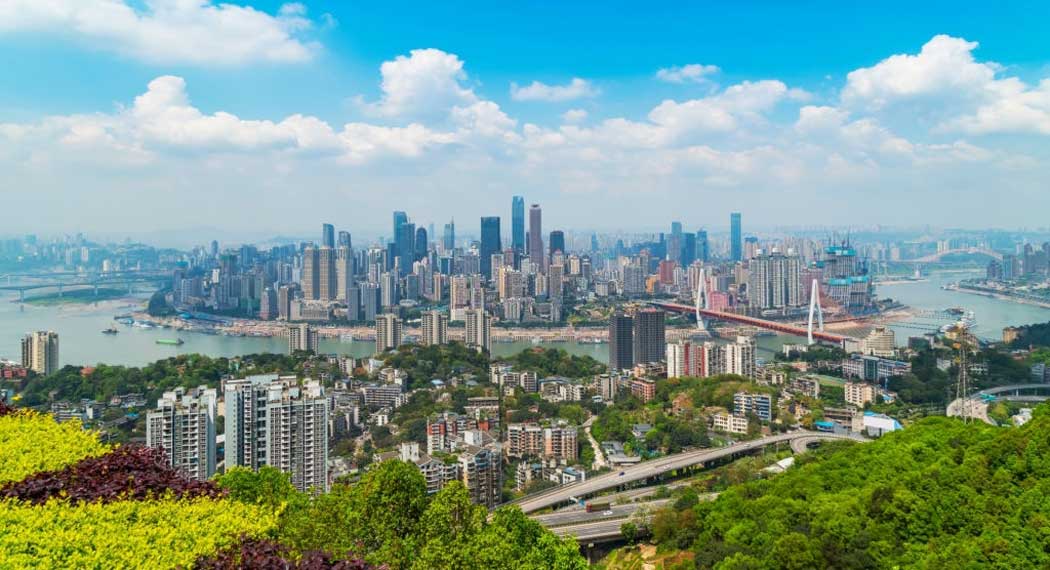When I first travelled to Chongqing in autumn 2018, I saw them for the very first time.
I have been told that they dominated the streets of this city for several decades and fascinated locals and foreigners alike. CGTN, the New York Times, the Economist, Al Jazeera, and many other media outlets reported about them. Even a documentary and a TV series were dedicated to them. The bang-bang.
The bang-bang, by locals also referred to as the “bang-bang army” or the “bang-bang brigade” are Chongqing’s itinerant porters.
The bang-bang are easy to spot, as they always carry their bamboo pole as work utensil with them. It is this pole that became the eponym for this professional group, as the word 棒子 bàngzi stands for stick in Chongqing dialect.
Just as a soldier is told to never leave his rifle unsupervised, I have never seen a bang-bang without this shoulder pole, no matter whether they climb the dimly lit staircases of a residential building or recruit clients on Chongqing’s busy streets.
When working, the pole rests like a yoke on the porter’s neck and shoulder, while the goods are attached with nylon ropes to both ends of the pole. Given the material characteristics of bamboo, the pole allows for a certain elasticity, absorbing some of the bumps.
However, I can tell you from my own experience, that lifting up bags with such a bàngzi is anything but comfortable. I tried it only once, and I’ve had enough!
I have been told that back in the days, in the narrow alleys from the ports of Chaotianmen to the warehouses not far from Liberation Square, motorized transportation could not compete with the speed of the bang-bang. No matter how heavy a load, how bulky a furniture, or how steep a staircase, a bang-bang would always find a way to bring goods swiftly and safely from its pick-up point to its destination.
This has earned the bang-bang the reputation of being Chongqing’s toughest workers.

It is no coincidence that this profession thrived and developed in the city of Chongqing. We often nickname Chongqing as the “mountain city”, the “city of bridges” or alternately “the water and mountain city”.
All those names allude to the municipality’s unique geographic location and its rough terrain at the confluence of mighty Yangtze and Jialing River.
While Yangtze River, Asia’s longest river, has been facilitating Chongqing’s trade with other cities in China and the world, Chongqing’s cliffs, gorges, and slopes, have been a hindrance to the city’s economic development – and a nightmare for any logistics professional. But these very obstacles were the perfect breeding ground for the profession of the bang-bang!
At their peak, there must have been around 300,000 bang-bang working in the bustling city of Chongqing, with the largest concentration in the central Yuzhong district.
Despite the ever-increasing number of elevators and escalators, bang-bang have survived until this day.
Some of them are specialised in the transport of water bottles for the business district’s water dispensers. For instance, the 20kg heavy water bottles in our office, on the 35th floor of a high rise in central Jiefangbei, are always delivered by the same friendly bang-bang.
Other bang-bang offer their home delivery services to shopaholics purchasing more than they manage to carry. Despite their adaptability to new market needs, it is undeniable that the bang-bang are less and less numerous these days. And there seem to be several reasons for this tendency.
First, Chongqing has evolved from a provincial hinterland to one of China’s growth engines. After the decision to establish Chongqing as a municipality under the direct administration of the central government in 1997, Chongqing has witnessed a double-digit GDP growth over several years.
Tunnels have been dug, bridges have been built, highways, subways, and speed train lines have been constructed. Now, Chongqing’s International Airport connects the municipality to major cities of the world, the multimodal Guoyuan Port links Chongqing to the world’s oceans, China Railway Express connects Chongqing with Russia and Europe, etc.
Also on a micro level, the city’s transport system has seen massive investments. I have only been living here for two years, but already during this short period I have witnessed the rapid expansion of the municipality’s logistics and transport infrastructure. It almost feels like a new bridge is built every week and a new subway station is opened every month. In other words, Chongqing’s ‘logistics nightmare’ transformed into a logistics and transport hub.
At the same time, along with the improved infrastructure, companies have invested in modern distribution centres. Thanks to 5G, the internet of things, and just-in-time delivery, many processes are automated and distributors require fewer stocks.
For the “last mile” transportation of a good to its destination, affordable courier services have emerged. E-scooters and other electric delivery vehicles are the new top dogs in this short distance transport market.

Moreover, today’s work force in Chongqing is better educated than twenty years ago. An increasingly large part of the working-age population holds university degrees or certificates of professional education.
These young, well-educated graduates are eager to apply their skillset in better paid and more promising industries. Also, relatively less educated persons have more job options now than they had in the past: For instance, e-commerce and live-streaming services enable young professionals to work from their home, as long as they have a device and a working internet connection.
These, together with other factors, have led to a recruitment problem for the bang-bang. At the same time, as many of the porters are getting older and retire from their profession, the bang-bang army slowly but continuously shrinks.
On the one hand, it fills me with a sense of melancholy to see a profession, unique to the city of Chongqing, slowly disappear. It is a profession inextricably linked with this city, just like the spicy Chongqing hot pot, the yellow taxis speeding through the narrow streets, or the city’s misty skyline.
On the other hand, I must acknowledge that the gradual retirement of the bang-bang army is the inevitable effect of Chongqing’s modernisation, made possible by its improved infrastructure, its reliance on new technologies, and its skilled workforce.
In all the nostalgia, I also try to remember that as iconic as the profession of the bang-bang is, it remains a very tough job with relatively low pay. Furthermore, regularly carrying loads weighing more than one’s own body weight can severally impact a person’s health.
Therefore, if Chongqing’s younger generation has the ability and opportunities to choose other career paths with higher salaries and better prospects, then we must also welcome such development.
If one day, the bang-bang army should indeed disappear from the streets of Chongqing, we should never forget their contribution to this city.
It is thanks to people like the bang-bang, who are not afraid of any burdens or obstacles, that Chongqing has become a rising metropolis.








Follow us